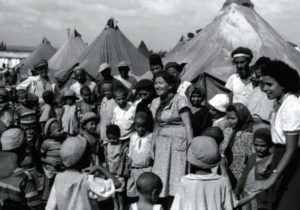 Benefits of Arab Peoples Pointed Out in Population Exchange
Benefits of Arab Peoples Pointed Out in Population Exchange
TO THE EDITOR OF THE NEW YORK TIMES-
James Batal’s letter, published in your issue of Aug. 3, brings back memories. Five years prior to the Arab-Jewish war in Palestine and before there was a question of hundreds of thousands of Arab refugees from Palestine, the writer of these lines advocated-in his book, “The Middle East- Crossroads of History,” and in articles in Harper’s, and later in support of the Hoover Plan-an Arab-Jewish exchange of population as the soundest and the most constructive solution not only for the Palestine problem, but also for the problems of the Arabs, and specifically for Iraq’s shortage in agricultural population.
It was this constructive and humanitarian character of the idea that has appealed to the mind of Herbert Hoover, the statesman and engineer, and prompted him in November, 1945, (once again, long before there were Arab refugees from Palestine) to propose the Hoover Plan for the settlement of both the Palestine and Iraq problems. In the words of Herbert Hoover-
“There is a possible plan of settling the Palestine question and providing ample Jewish refuge. It is at least worth serious investigation, for it offers a constructive humanitarian solution.
“In ancient times the irrigation of the Tigris and Euphrates Valleys supported probably ten million people in the kingdoms of Babylon and Nineveh. The deterioration and destruction of their irrigation works by the Mongol invasion centuries ago, and their neglect for ages, are responsible for the shrinkage of the population to about three and a half million people in modern Iraq * * *.
Development in Iraq
“My own suggestion is that Iraq might be financed to complete this great land development on the consideration that it be made the scene of resettlement of the Arabs from Palestine. This would clear Palestine completely for a large Jewish emigration and colonization. A suggestion of transfer of the Arab people of Palestine was made by the British Labor party in December, 1944, but no adequate plan was proposed as to where or how they were to go.
“There is room for many more Arabs in such a development in Iraq than the total of Arabs in Palestine. The soil is more fertile. They would be among their own race, which is Arab speaking and Mohammedan. The Arab population of Palestine would be the gainer from better lands in exchange for their present holdings. Iraq would be the gainer, for it badly needs agricultural population.
“Today millions of people are being moved from one land to another. If the lands were organized and homes provided, this particular movement could be made the model migration of history. It would be a solution by engineering instead of by conflict.” * * *
The Arabs have preferred all along the ways of conflict and war to those of engineering and construction. For that, I submit, they can blame nobody but themselves. If there are today many thousands of homeless Arab refugees from Palestine, the responsibility is to be laid at the doors of the Arab leaders who started the war in Palestine.
Zionist Position
Essentially, the Zionist position has not changed since 1945. Mr. Batal misrepresents the situation when he speaks of a forcible exchange of populations. The exchange can come about only by consent of both sides. Should real patriotism take the place of warmongering and spiteful obstructionism with the Arab politicians, they would agree to an exchange of populations, which would greatly benefit the Arabs of Palestine, the Arab countries of the Middle East, as well as Israel and the Jews who now live in the Moslem countries.
If they remain adamant to the call of reason, no exchange of populations can take place. But the Arab refugees from Palestine who run away because of fear or the propaganda of their own leaders will remain, I fear, homeless and hungry for a long time to come.
ELIAHU BEN-HORIN.
Jackson Heights, N. Y., Aug. 3, 1948.